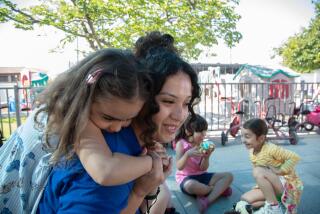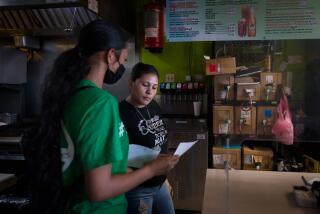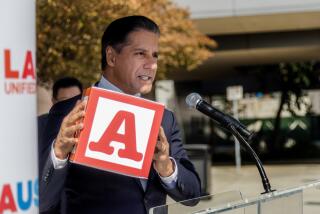Parents Will Be Surveyed on Support for a School Clinic
- Share via
More than 5,000 parents in the Mid-City community anchored by Hoover High School will receive a one-page survey late this month asking whether they support a health and social services center for all area students--from kindergarten to 12th grade--to be located on the high school campus.
A special committee of Hoover parents, teachers and administrators approved the questionnaire Thursday, which will ask what specific services community residents would favor at a clinic, including whether they support providing information about birth control and other sexual matters, and/or whether they support providing contraceptives.
Committee members concluded that they must ask detailed questions about birth control and contraceptives, since opponents of school-based clinics have consistently argued nationwide, as well as locally, that such centers are merely family planning centers masquerading as comprehensive health facilities.
“We need to ask the questions or else the survey could be thrown right back in our faces” by opponents, Hoover High teacher John Collins said. Hoover administrators will present the results next month to a multi-agency task force of city, county and school officials, which hopes to establish a health center as a way to improve medical, counseling and career-related services to students.
The survey will be distributed to parents of students at seven elementary schools, at Wilson Middle School and at Hoover beginning March 31. Teachers at the elementary schools will give the survey to students to take home, while Hoover and Wilson personnel will mail the surveys to the students’ parents. Parents will have a week to complete them.
The questionnaire was prepared with the help of San Diego State University political scientist C. Richard Hofstetter. The university offers special programs and assistance to Hoover under a partnership arrangement. It was deliberately kept to a single page and uses non-technical language, both to be easily understood and easily translated into Spanish and several Indochinese languages, reflecting the socioeconomic diversity of Mid-City, where half the school-age population has no regular health care, according to an earlier Hoover student survey.
The survey asks whether parents have heard of the clinic proposal and whether in general they think it is a good or bad idea. They are then asked to approve or disapprove of potential services.
The services could include: counseling on job opportunities, personal family problems, pregnancy and sexual problems, police-related problems and drug and alcohol problems; medical care for illnesses and injuries; physical exams; immunizations and medications; referrals for specialized medical and dental care; health and dental referrals and providing contraceptives.
There are no abortion-related questions because such clinics would neither handle abortions nor make abortion referrals, officials said.
The multi-agency task force, known as New Beginnings, will probably get the results sometime in April. New Beginnings asked the Hoover committee to do the survey as a way to gauge community support after learning that Hoover teachers and parents were exploring ways on their own to improve the school’s health and counseling care.
Assuming that a majority of the Hoover-area parents approve all or part of the clinic idea, the proposal will go before the San Diego city schools board. The board’s approval would be required before administrators could seek private foundation funding to set up a health center.
A proposal initiated three years ago by schools Supt. Tom Payzant for school-based clinics as a districtwide policy was turned down, 3 to 2, by school trustees after a bitter battle that anti-abortion opponents turned into a debate over the morality of providing family-planning counseling for teen-agers.
A random scientific poll taken for the district last fall showed strong support for such clinics, from 66% to 76% of those surveyed, depending on whether funding was public or private.
The Hoover community survey is not random, which means that the number of responses will determine how accurately it represents attitudes of parents, Hofstetter of San Diego State said.
“This is an attempt to consult all parents, and it is true that the more highly motivated people, pro or con, will be more likely to respond and those relatively indifferent to the issue won’t,” Hofstetter said. But a statistically random survey, in which pollsters do at-home or telephone interviews, costs as much as $20 an interview, Hofstetter said, an expense that Hoover cannot afford.
“So here the school, given its limited resources, is giving every parent an opportunity to respond. I’d like to see as high a response rate as possible. . . . If they get 75%-80%, that would be comparable to what commercial firms get with all the call-back checks and incentives to respond built in.
“I don’t know what they will get, but I will say that parents do see a school questionnaire as legitimate and, with kids in school, they are more likely to be responsive” than if they received a similar mail-type survey done by a commercial firm.
More to Read
Sign up for Essential California
The most important California stories and recommendations in your inbox every morning.
You may occasionally receive promotional content from the Los Angeles Times.













